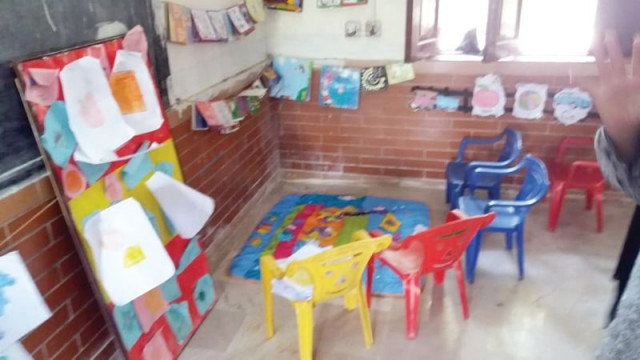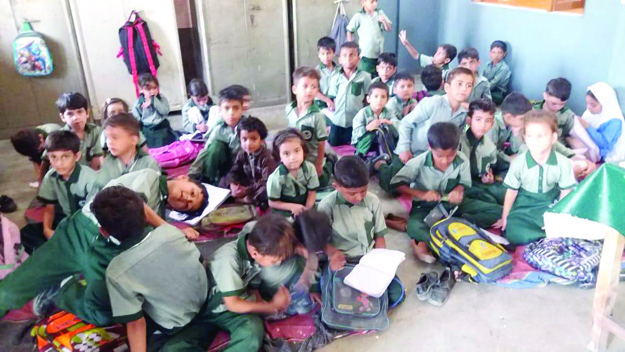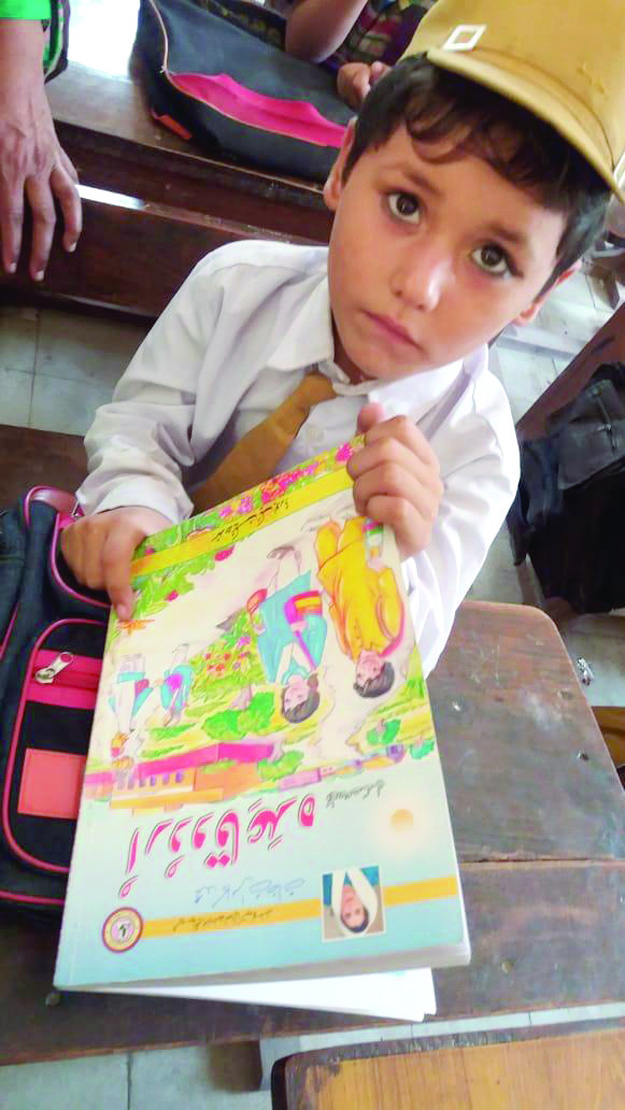Sindh’s early childhood education policy struggles in infancy
The centres run without funds, proper infrastructure and even a syllabus

In most schools, the children sit on carpets and study advance class one course material. However, in some places the situation is better and along with furniture, wall decorations can also be observed. photos: express
Unfortunately, there was none for the Singh government's Early Childhood Care and Education (ECCE) initiative. The scheme, envisaged for the education and protection of minors, before the primary school age, is now a victim of the traditional lack of interest by the education department and other government officials.
The ECCE initiative was drafted in 2015, but lies buried in files at the School Education Department. Its implementation, in the form of schools (montessori, kindergarten, nursery) to be built across the province, including Karachi, suffered negligence on the part of the Sindh government.
The centres that were established lacked provision of budget, proper infrastructure and even a syllabus. Many of the teachers were not even provided basic training. This was revealed when The Express Tribune visited approximately a dozen of the early childhood education centres established in different government schools of Karachi.

The ECCE system, itself, is being run without a budget. There is also no syllabus that could be provided to the concerned schools to guide them. As a result, the books for grade one students are being taught to the pre-schoolers.
Reality check
The montessori section of the Full Bright Government Boys Primary School established in the premises of the Allama Iqbal School is devoid of even basic furnishings. When The Express Tribune visited the facility, more than 35 students clad in school uniforms were sitting on a carpet studying class one books. The student' shoes were piled on one side. There was no cupboard in the classroom or outside for the students to keep their bags or other items. One junior school teacher (JST) was teaching the first grade Urdu text to the students.
Balochistan Governor urges right to education for all
At the same school, the fourth and fifth class students were being taught in a single room near the Montessori class. Since there weren't enough classrooms, the students of the fourth and fifth classes were made to sit in the same class facing black boards in opposite directions while two different teachers spoke to them from either end of the room.

In the same premises, another school named Masoomia Government Boys Primary School Number 1, had managed to provide worn out desks to the students of the Montessori class, but due to the shortage of space and a large number of students, two classes of early childhood education were taking place in a single classroom. Moreover, there was only one teacher teaching the two classes.
Relatively better conditions were found at the centre established in Ibrahim Ali Bhai Girls School Campus in Gulberg. The Montessori class had been established in a spacious room equipped with furniture and tiled flooring. Decorative academic and educational material adorned the walls, similar to the ones at private schools, to keep the young children interested in school. The principal of the school, Shaheena Naheed, said that the furniture was provided by the department but all the other items had been brought in by other teachers on their own.
One of the two teachers present there had received training provided by the School Education Department at the teacher's service centres. This teacher, on the basis of the experience availed from this training, had managed to compile a syllabus of sorts, but as with the other two schools, this Montessori had also been provided the first class syllabus by the School Education Department.
In Federal B Area's Azizabad, two schools named Anglo Oriental Government Boys Primary School and Royal Academy Government Boys Primary School are operating in the same premises. Both have Montessori schools established under the early childhood education system, though there is a stark difference between the two.
The former lacked furniture and the students sat on a carpet. Over 40 students were enrolled in the Montessori, where they sat uncomfortable close to each due to want of space. The school was not equipped with the items required for educational and instructional purposes, while the principal complained that the students sat on rugs due to non-provision of furniture by the School Education Department.
On the other hand, the nursery of the Royal Academy Government Boys Primary School was to a great extent in line with academic standards. The syllabus of the first grade published by the Sindh Textbook Board was being taught there. The principal, however, claimed that they could not get the syllabus for the early childhood education, which had been prepared, but remains unpublished.
In the Montessori of the Government Boys Primary School in Paposh Nagar, the classes functioned without electricity for the past several days as K-Electric had cut the power supply due to the non-payment of dues.
The principal, referring to lack of water, said that the water motors were no longer functional and the overhead tank was empty because of the power cut. The principal added that washroom facility and the provision of water was a necessity for the pre-schoolers enrolled in the early childhood education.
At the Nazimabad's Karachi Montessori and Islamia English School, junior school teachers were found teaching the first grade syllabus to the students enrolled in early childhood education.
The situation was, however, relatively better at Al-Zehra school in Liaquatabad. The walls of the class were seen decorated with teaching material and the classrooms had special chairs and tables, in line with the requirements of early childhood schooling.
However, few senior classes were arranged in the corridor of the school due to the lack of space. Afsheen Zehra, the principal, said that the management of the secondary school in the same campus had vacant classrooms that they were locked. "Despite the fact that the classrooms aren't regularly used, the management isn't willing to give us the space", said Zehra. She added that the directorate staff or the School Education Department was unwilling to do anything about it.
Curriculum update: Govt to revamp education system
The original idea
Former education secretary Fazlullah Pechuho, through a notification on March 3, 2014, had formed a 24-member task force, comprising education officials academics, to set up an early childhood education system in Sindh. The chief programme manager for the Reform Support Unit was made the chairperson of the task force. Representatives from Sindh Teacher Education Development Authority, Bureau of Curriculum, Sindh Institute of Teacher Education Textbook board, Sindh Education Foundation, United Nations Educational, Scientific and Cultural Organisation, Indus Resource Centre, Right to Play, Save the Children, Plan International Pakistan, Teacher Resource Centre, Idara Taleem-o-Agahi, National Commission for Human Development and United Nations International Children's Emergency Fund were made members of the task force.
The task force was mandated to design the syllabus, formulate a method for appointing teachers as per required degrees, and prepare a mechanism for establishing early childhood education centres.
The task force took nearly 28 months to submit its recommendations.
On December 4, 2015, Pechuho, after considering the recommendations, issued another notification through which the ECCE policy was issued. It was aimed at providing a strong foundation for mental training and development of children.
Children in the age bracket of 3-5 years old were to be kept associated with the early childhood education centres for at least a year before they enrolled in primary schools. The primary schools were to be chosen and provided additional budget, including teachers and other facilities.
Moreover, special desks, chairs, soft boards, white board, cupboards, keyboards, DVD player, LCDs, multimedia, computers, tape recorder, audio CD player, electric water cooler, library tables, library books, carpets, portable soft boards, Montessori materials, number puzzles, animal cards (puzzles), fruit puzzles, letters of the alphabet, colouring pencils and other relevant materials were also to be provided.
However, the pre-primary schooling system failed to make its mark. The Sindh Education Minister Syed Sardar Shah told The Express Tribune that the School Education Department would publish the early childhood education syllabus for the next educational session. The minister said that the syllabus is ready for publishing and the hiring of teachers is under way. "Soon, written examinations for more hiring would be held and the entire situation will be addressed," said the minister.
Published in The Express Tribune, October 29th, 2018.



















COMMENTS
Comments are moderated and generally will be posted if they are on-topic and not abusive.
For more information, please see our Comments FAQ